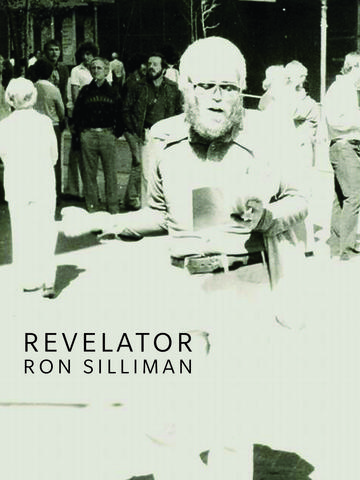Revelator is the opening poem in a major sequence entitled Universe. It’s the jumping off point for a work that, were Ron Silliman to live long enough, would take him three centuries to complete. We are hopeful.
Universe is a poem of globalization and post-global poetics (which Silliman feels is an important reason for publishing this key section outside of the USA). At its core, it addresses the problem that there are only two global systems: the biosphere and capital, while every response to these global systems is invariably local.
The first appearance of Revelator in a journal won Poetry’s Levinson prize, previously given to poets such as Robert Creeley, Theodore Roethke, Geoffrey Hill, John Ashbery, Robert Duncan, Basil Bunting, William Carlos Williams, Dylan Thomas, Hart Crane, Robert Frost, and Wallace Stevens.
Praise for Ron Silliman:
“Called a ‘thaumaturge’ (‘wonder-worker’) by the poet Robert Duncan, Silliman has created a new kind of writing from the simplest materials.... The poet confides, describes, extols, remarks, puns, paints domestic scenes, slyly alludes, records minutiae, leaps to large statements, arouses, repeats. Through it all, a friendly, Northern California sort of personality emerges.”
– David Melnick, San Francisco Chronicle
“The chief effect is a brilliant sense of immediacy which is not, however, fixed or formalized. The text is restless in its presentness, restless in a presentness which at all points vibrates with its relations to the past and its commitments to the future.... Silliman’s text is a vast trope of the human world.”
– Jerome J. McGann, Critical Inquiry
“Silliman is one of the most highly respected writers in the circles of the Language Movement. Along with Barrett Watten and Lyn Hejinian, he has been a central figure in the Language Movement’s San Francisco scene for almost twenty years. He is the author as well of some of its most distinguished books of poetry, including Ketjak, Tjanting, the recently published Age of Huts, and the as yet uncompleted, and massive, project known as The Alphabet. Silliman is the author of a large body of trenchant prose work as well, including some of the movement’s most important theoretical essays, and he has recently assumed editorship of Socialist Review.... The Language Movement in general represents a vigorous Left critique of American culture and society, and Silliman has been one of the movement’s most powerful and consistent voices in developing that critique.”
– Jerome McGann, London Review of Books
“What I find most striking about Silliman’s sentences is that they’re fun; they give pleasure in many different ways, through their wit, their allusiveness, their visuality, their phonetic texture, their descriptive precision, or their sheer unlikeliness.”
– Roger Gilbert, Contemporary Literature
Under Albany is the shadow movement of Ron Silliman’s epic of everyday life, The Alphabet. Silliman provides a set of extended, vividly etched, mostly autobiographical, meditations on the background for each of the original 100 sentences of his 1981 poem Albany. This constructivist memoir provides an exquisitely rich exploration of the relation of context to reference, subtext to meaning, back story to presented experience, and composition to poetics. All of Silliman’s work unravels and reforms in this exemplary and exhilarating act of attention, recollection, and reflection.
– Charles Bernstein
Of all the Language Poets, Silliman’s express-line writing was and is the one that stuck to my ribs. It was so thingy, so specific, so formally radical, so hard-headed, yet witty, and now and then, in spite of itself, lyric. I liked his post-industrial music. I loved Ketjak and Tjanting and Paradise... And the reach – the compulsion to pull everything in.
– C.D. Wright, Jacket
With startling frankness, Under Albany lifts each “new sentence” of Silliman’s Albany to show us what’s underneath. The resulting paragraphs are glimpses not only into Silliman’s history, but into that of our times. Each is a sensitive seismograph recording shocks of social struggle.
– Rae Armantrout



